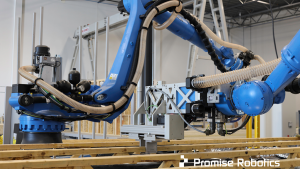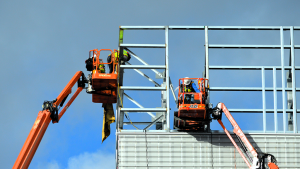Kelowna, B.C. is developing artificial intelligence (AI) to help streamline planning, development and permitting processes.
The city has been working with Microsoft to develop a chatbot that will answer questions, provide information and, eventually, process some planning and development permits.
If, for example, someone asked KAI (Kelowna AI) what they were allowed to do on their property, the bot could help them figure that out.
“We get thousands of permit applications every year,” said Ryan Smith, Kelowna’s divisional director of planning and development services. “Most of the people applying aren’t familiar with the regulations or the process and it takes our staff a lot of time to process their applications.”
Smith said KAI will help walk permit applicants through the first part of the process.
“It will be a win-win,” he said. “There will be better customer service that takes less time for us and for the permit applicants, and nobody in the city will lose their job.”
In its early days, KAI will be online only, although it could be expanded later to voice.
“The system is being tested now,” Smith said.
The city expects it will be available to the public in fall 2023.
Kelowna is telling other municipalities what it is learning about AI.
Doug Gilchrist, Kelowna’s city manager and chief administrative officer, made a presentation called The Art of the Possible: AI Implementation in Local Government at the recent Union of BC Municipalities annual convention.
“We were asked (at the convention) about the cost and footprint of this work within the organization,” said Gilchrist. “We had questions about the ethics and accuracy of AI, which we acknowledge is a critical component of being successful. It is a high priority, but easily addressed.
“For the most part, I think people were excited about the future and impressed with the path we are on.”
The B.C. construction industry often has challenges with permitting, said British Columbia Construction Association president Chris Atchison.
“Different municipalities have different requirements and policy documents,” said Atchison. “It’s a real labyrinth of procedures and regulations, which makes it hard for contractors to get things done.”
Engineers are also concerned about permitting.
“Our members have a unique perspective, due to their work in preparing, submitting and reviewing engineering permit submissions,” said Caroline Andrewes, president and CEO of Association of Consulting Engineering Companies British Columbia (ACEC-BC).
Members of the ACEC-BC Building Engineering Committee identified several challenges – a disconnect between policy and practice, lack of clear requirements for building permit submissions and conflicting requirements between jurisdictions.
“We encourage full adoption of digital submission and review, which is more efficient for making and documenting changes during permitting review, and supports collaboration,” said Andrewes. “Over the past year we have noticed many B.C. municipalities taking positive action to manage backlogs and improve process transparency.”
For example, the City of Vancouver is developing the Permitting Improvement Program and is digitizing its regulations.
It has developed two digital tools to help people submit a complete and compliant permit application.
Project Requirements Exploration Tool (PRET) allows applicants to explore and understand all regulations and requirements associated with their project.
eComply enables them to upload and check all their project designs and drawings to make sure they follow regulations.
Corrie Okell, Vancouver’s director of permitting services, development, building and licensing, said PRET is being tested now and is expected to be launched in fall 2023 on the City of Vancouver permit application website.
Ecomply will be ready for use in the first quarter of 2024.
Across Burrard Inlet in the District of North Vancouver, Dan Milburn, general manager of planning, properties and permits, said, “We are already using technology in various ways to engage with our customers and the public, including providing online and electronic permit application submission, payment processing, plan review, responses to requests for service, inspections, and approvals.”
Milburn said the municipality is “intrigued” by the use of AI to assist its customers.
“We will be exploring the use of new electronic tools as we undertake a development application process review that will look at all our development processes,” said Milburn.
Don Luymes, general manager of planning and development at the City of Surrey, said the municipality is continuing to develop digital portals.
“Surrey is committed to the application of digital technology to permitting, including guaranteed time limits,” said Luymes. “We’re keenly interested in AI, but it’s still early days, and we know that it’s not a silver bullet. We still need people.”










Recent Comments